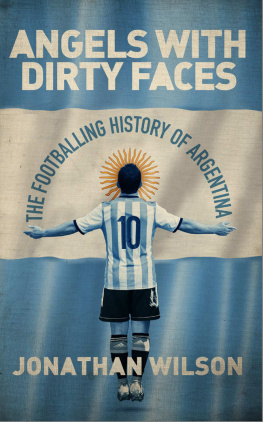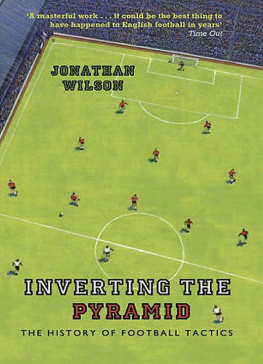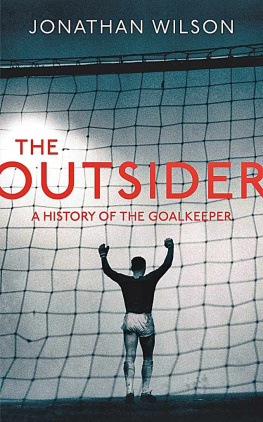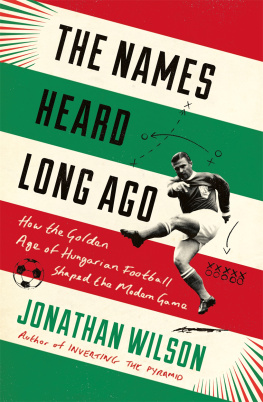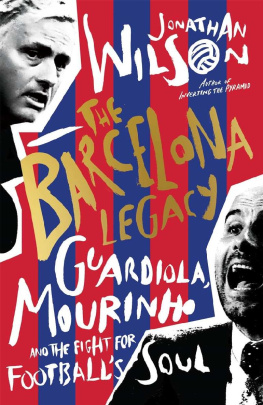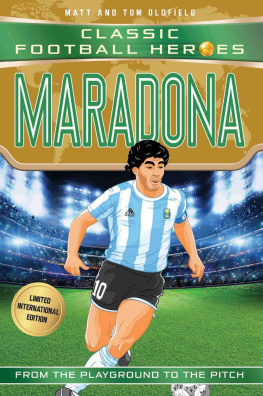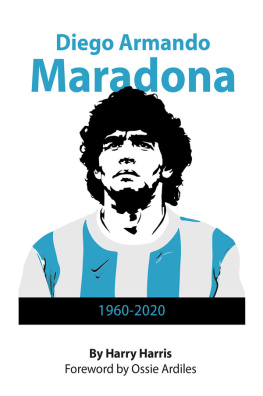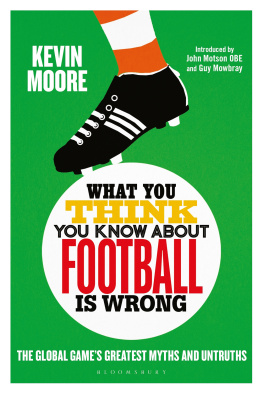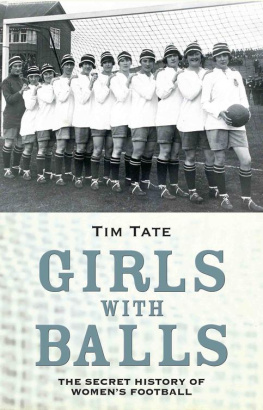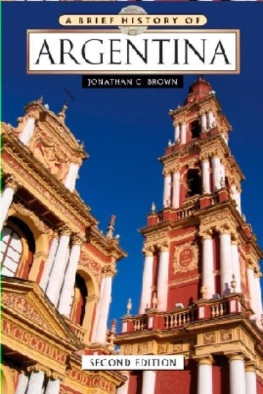ANGELS WITH DIRTY FACES
The Footballing History of Argentina
JONATHAN WILSON

CONTENTS
SECTION ONE
SECTION TWO
No non-fiction book is ever anything but a collaborative effort. Once again, I have been humbled by the amount of time and effort people have offered in the writing of this book.
Particular thanks are due to Martn Mazur, who, despite extremely trying personal circumstances, was a huge help in setting up interviews, translation and archival research. Its not an exaggeration to say that this book couldnt have been written without him. Thanks also to Alejandra Altamirano Halle.
Kat Petersen again turned her stern eye and sterner eyebrows to correcting the text. I hope immersion in the curiously fey world of El Grfico covers made it worthwhile. Thanks are also due to Rodrigo Orihuelo, who cast his expert eye over sections of the manuscript and made valuable suggestions. Im grateful also to the copy-editor John English for his work cleaning up my words.
At Orion, Im especially grateful to Alan Samson for his patience, his suggestions in streamlining the narrative and his acceptance that the occasional tangent into the history of barbed wire and headgear in early Argentinian cinema adds depth. Thanks also to Ian Preece, Paul Murphy and my agent David Luxton for their support and advice.
I know that a lot of Argentinians spend most of their days sitting in cafs reminiscing about the old days, but they didnt have to do it for me, so thanks are due to all those who agreed to be interviewed, particularly the ones who didnt try to strangle me to make a point.
The impetus to write this book came from Araceli Alemn and Im grateful to her for that, for all her wisdom, support and generosity over the years and for lending me numerous books.
Thanks also to the staff of St Georges Hospital, Tooting, without whose efforts I might not have been around to finish the book.
So many people helped with logistics, suggestions and advice that its almost inevitable Ive missed somebody (sorry) but thanks for their help in various ways and at various times to: Marcela Mora y Araujo, Roberto Assaf, Philippe Auclair, Guillem Balagu, Esteban Bekerman, Andrs Campomar, Neil Clack, Dan Colasimone, Miguel Delaney, Dan Edwards, Ezequiel Fernndez Moores, Alex Galarza, Klaus Gallo, Seba Garca, Rick Glanvill, Cassiano Gobbet, Ian Hawkey, Henrik Hedegs, Sam Kelly, Sndor Laczk, Sid Lowe, Ed Malyon, Fderico Mayol, Scott Oliver, Gunnar Persson, Joel Richards, Miguel Ryan, Robert Shaw, Rory Smith, Ivan Soter, Tim Vickery and Pablo Vignone.
Una cigarrera sahum como una rosa el desierto. La tarde se haba ahondado en ayeres, los hombres compartieron un pasado ilusorio. Slo falt una cosa: la vereda de enfrente.
Jorge Luis Borges, Fundacin mtica de Buenos Aires
A cigar store perfumed the desert like a rose. The afternoon had established its yesterdays, The men shared an illusory past. Only one thing was missing the other side of the street.
THE GAME SHOULD NEVER HAVE been in the balance, but it was. Argentina had battered Brazil, created chance after chance, had shot after shot, yet it was only with three minutes to go that Humberto Maschio, the tough inside-right from Racing, finally made it 20. In the wave of relief that followed, the Independiente winger Osvaldo Cruz added a third and Argentina, with a game to spare, were South American champions for 1957, their eleventh title. As the players celebrated on the pitch after the final whistle in the Estadio Nacional in Lima, a microphone was handed to the River Plate defender Federico Vairo so he could address the crowd. Although a leader, he was a player whose gentle face suggested concern most of the time and, on this occasion, his emotions overwhelmed him. He tried to compose himself, gripped the microphone more firmly, but when he began to speak, his voice was tremulous. Its he said uncertainly, its all thanks to these caras sucias , to these five sinvergenzas His voice trailed away and he handed the microphone back to the official whod thrust it at him. Hed managed only one sentence, but in it, he both gave that team the name by which history would know them and encapsulated the spirit of Argentinian football to that point.
Nobody had any doubt to whom Vairo was referring. The forward line of Omar Orestes Corbatta, Humberto Maschio, Antonio Angelillo, Omar Svori and Osvaldo Cruz had been devastating throughout the tournament, playing skilful, fluent football that resonated with a sense of enjoyment. What better name for the five players who had inspired Argentina to the Campeonato Sudamericano than los ngeles con caras sucias the Angels with Dirty Faces a nod to the 1938 film starring Jimmy Cagney and Humphrey Bogart and a recognition both of the impudence of their style and the carefree way in which they played, which extended to a less than rigorous attitude to training. Svori drove [the coach Guillermo] Stbile mad, said the left-half ngel Pocho Schandlein. If the bus left at eight for training, Svori was always missing and hed show up at ten in a taxi. Svori liked to sleep
In time the Carasucias as the nickname was abbreviated came to stand for the great lost past of the Argentinian game, a golden age in which skill and cheek and fun held sway, before the age of responsibility and negativity. The image of the past may have been romanticised, but the sense of loss when it was gone was real enough and, in that nostalgia for an illusory past when the world was still being made and idealism had not been subjugated by cynicism, is written the whole psychodrama of Argentinian football, perhaps of Argentina itself.
In 1535 Don Pedro de Mendoza set off across the Atlantic from Sanlcar de Barrameda, Cdiz, with thirteen ships and 2,000 men, having been named governor of New Andalusia by Charles V, Holy Roman Emperor and King of Spain. Mendoza, and those at the imperial court who granted him half the treasure of any local chief conquered and nine-tenths of any ransom received, dreamed of a land of immense wealth. What he found was a vast prairie populated by hostile tribes, whose culture seemed primitive when set against the sophisticated and wealthy empires of Mexico and Peru.
The whole expedition was a fiasco. Mendozas fleet was scattered by a storm off Brazil, then his lieutenant, Juan de Osorio, was assassinated; some say Mendoza ordered the murder because he suspected him of disloyalty. Although Mendoza sailed up the Ro de la Plata and, in 1536, founded Buenos Aires on an inlet known as the Riachuela, any sense of accomplishment was short-lived. Mendoza was confined to bed for long periods by syphilis, while early cooperation with the local Querandes turned to rancour. The three-foot adobe wall that surrounded the settlement was washed away every time it rained and, without the help of the local people, the early settlers struggled to find food and were reduced to eating rats, snakes and their own boots before finally resorting to cannibalism. As the population dwindled, killed by the indigenous people, illness or starvation, Mendoza decided to return to Spain to seek assistance from the court. He died on the voyage back across the Atlantic.
Help did finally arrive, but it was insufficient and too late. In 1541 the few survivors of Mendozas mission abandoned Buenos Aires and headed north for Asuncin. They did, though, leave behind seven horses and five mares which, doubling their population roughly every three years, became an essential factor in the gaucho culture that dominated Argentina three centuries later.
From the very beginning, Argentina, the land of silver, was a myth, an ideal to which the reality could not possibly conform.
I used to live, on and off, in a flat just off Avenida Pueyrredn where the district of Recoleta starts to become Palermo. If I turned left out of the door and walked past the hospital, carried on for four blocks, past the deli whose owner would loudly lament in English that only Europeans really understood cheese, and then turned right up the hill, Id come to the cemetery where eighteen presidents, the writers Leopoldo Lugones and Adolfo Bioy Casares, and Eva Pern perhaps the greatest of all Argentinian myths are buried.
Next page
